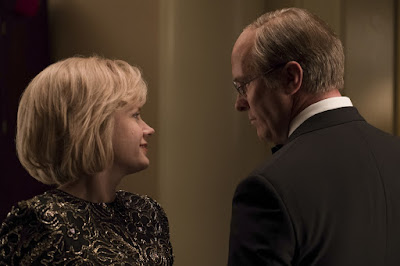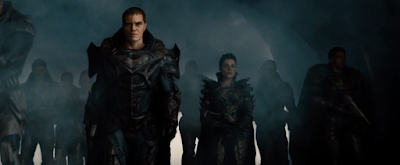Nominated For: Best Picture, Best Director; Adam McKay, Best Actor; Christian Bale, Best Supporting Actor; Sam Rockwell, Best Supporting Actress; Amy Adams, Best Original Screenplay, Best Film Editing, and Best Makeup and Hairstyling.
Won: Best Makeup and Hairstyling.
Vice explores the epic story about how a bureaucratic Washington insider quietly became the most powerful man in the world as Vice-President to George W. Bush, reshaping the country and the globe in ways that we still feel today.
Written and directed by Academy Award-winner Adam McKay, Vice is McKay's seventh directorial feature. Before 2015, McKay was mostly known for writing and directing mainstream comedies starring Will Ferrell such as Anchorman, Step Brothers, Talladega Nights, and The Other Guys. Then he made The Big Short and wound up winning the Oscar for Best Adapted Screenplay while the film received a total of five nominations including Best Picture and Best Director. Tasked with explaining the housing market crash of the late 2000s, McKay simplified matters via fourth wall breaks, symbolism, celebrity cameos, and so much more. Clearly, the switch-up worked well for McKay though, so it's not surprising he'd carry that style over to Vice. However, this time he's wholly demolished the fourth wall and dialed everything up to an eleven. So, chances are, you'll hate this film if you weren't a fan of The Big Short. Vice is already proving to be quite divisive amongst critics and audiences alike, but that should be expected given the political subject matter. Some may feel offended by McKay's twisted satire while others may think he didn't go far enough.
Whatever the case may be, I'm not easily offended or all that interested in political rhetoric, so I personally wasn't bothered by any of McKay's creative decisions. In fact, I can't help but respect McKay's ambition due to the twisted, subversive route which Vice explores alongside its audience. Vice has little in common with traditional biographical pictures, and that was so refreshing to witness. Usually, bio-pics are a favorite of the Academy, so I wind up watching a few every year, but they rarely surprise me or differentiate from what's come before concerning narrative structure and style. There's nothing wrong with following a formula or abiding by a proven approach, but I'll be much more likely to admire bolder technique than something I've seen a thousand times before. McKay really swings for the fences with lacking subtlety, risky comedic gags, and some very inspired editing choices. While I wouldn't necessarily say every risk paid off, I found the dark comedy to be hilarious and the film to be more entrancing as it went on.
McKay's method of presentation maintains a brisk momentum to what could have otherwise been a dull look at the life of Dick Cheney and his rise to unprecedented power. Just when you're expecting drawn-out dialogue, McKay cuts away. In spite of breezy pacing and humor, McKay upholds a degree of seriousness and grounds his depiction of Cheney somewhere between the extremes of caricature and a sympathetic lead. He's humanized to an extent but still seen as evil by the camera. In one particular fourth-wall break, Cheney provides his own justification for his actions, though the film doesn't concede to his viewpoint. One audience member left at that point, and if you're thinking this film seems to skew far too left, don't worry... McKay's well aware and calls himself and the audience out in a bonkers post-credits scene that I considered a riot (this will contribute to the film's polarized reception more than anything else).
Regarding production quality, cinematographer Greig Fraser makes effective use of shadows and low-lighting, Nicholas Britell offers a varied set of compositions in his score, and the production design's excellent while the hair and makeup work is extraordinary, going a long way to transform the illustrious ensemble convincingly. Also, as a brief side-note, the events in Vice are clearly embellished and exaggerated for comedic effect so don't expect a historically accurate glimpse into Cheney's life. The filmmakers acknowledge as much with an opening title card that informs the audience Cheney was a secretive man so they "tried their f*cking best." I just went along for the ride with an open mind.
Elevating Vice from an experimental passion project to a serious awards contender, Christian Bale's once again committed wholeheartedly to physically transforming himself for a role. Over the years, Bale has gone through cycles of intentional weight loss and gain to better embody his characters, just look to The Machinist, The Dark Knight Trilogy, and American Hustle for evidence of this. It's surely an unhealthy practice, and Bale's recently acknowledged that it's beginning to catch up with him as he enters his late forties. Bale slips into the guise of Cheney like it's nothing and perfectly replicated his vocal mannerisms, steely gaze, and cold composure. Matching Bale beat-for-beat is counterpart chameleon actress Amy Adams. As Lynne Cheney, Adams only gained about 12-15 pounds in comparison to Bale's approximated 40-pound pack-on, but she wears the conniving Lynne Cheney persona like a glove. Their devious dynamic and calculated scheming behind-the-scenes in Washington D.C. was a fascinating and unnerving background element which enhanced the film's shady atmosphere. Both performances are well deserving of their current awards buzz, and I hope the momentum translates to Oscar nominations for the two of them at the very least.
Amongst the stellar supporting cast, Sam Rockwell, Steve Carell, Tyler Perry, and Jesse Plemons all put forth solid performances. Rockwell channels the dopier side George W. Bush to great comedic effect, and Tyler Perry plays Colin Powell as very straight-faced. It honestly took me a while to view Donald Rumsfeld as anything other than Carell in extensive makeup, but as the film went on, that notion disappeared. Lastly, I wouldn't dare spoil Plemons role, but that will prove divisive to many as well. As for me, I personally dug it and considered it to be an interesting framing device.
Vice is without a doubt the 2018 release vying for the title of the most creative feature, brimming with nuanced black comedy most filmmakers wouldn't dare poke with a twenty-foot-long stick. Not every component sticks the landing, but those which do, further contribute to the film's fascinating storytelling approach in a satisfying manner.





































